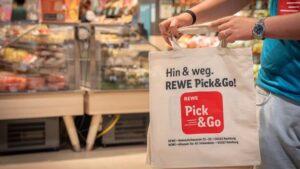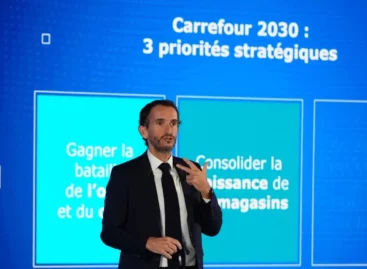Rewe opens Europe’s largest autonomous supermarket
Rewe has opened Europe’s largest autonomous supermarket in Hamburg. Its surface area of 1,200 sqm is enough to regain the record from rival Netto.
Four check-out systems
The German supermarket chain is scaling up its checkout-free system with computer recognition: after extensive tests in Berlin, Cologne, Düsseldorf and Munich, the huge Pick&Go supermarket in Hamburg’s Hoheluft West district offers a range of 20,000 items on a retail area of more than 1,200 sqm, thus taking over the title of “Europe’s largest autonomous supermarket” from competitor Netto (in Regensburg).
However, the shop is completely autonomous: it is a hybrid supermarket where customers can pay in four different ways. They can queue at the traditional staffed checkout, opt for the self-scanning checkout, pay cashless via the Pick&Go app or pay at computer-vision-enabled terminals, which eliminate the need for scanning. The latter is the real game changer, Rewe says, because now customers can also use it without the Pick&Go app.

Amazon quits
The third and fourth options both rely on smart cameras with image recognition, which recognise what people take from the shelves and put in their trolleys or bags. It is the same kind of technology that Amazon also used in its Go supermarkets with ‘Just Walk Out’ option, but which Amazon recently said was unprofitable. Not only did it prove to be incredibly expensive, but it also required constant human checks from India to train the AI system.
However, unlike Amazon, Rewe continues to believe in the system. A second location is already planned in Hamburg: barely two kilometres away from the recently opened supermarket, a Pick&Go branch of 900 sqm will open after the summer. The shop was already being remodelled in mid-June, but Rewe is doing tests all summer before reopening. A (largely) autonomous supermarket is also coming to Düsseldorf and the chain is already ready to implement the concept throughout Germany.
Rewe stresses that the technology collects only “minimal data”: the solution generates a 3D model of the supermarket that digitally maps its surroundings and movements. “Data minimisation principles are followed when processing the customer images recorded by the system. They are used exclusively to enable checkout-free shopping in the store. The system only records data identifying items removed or placed back on the shelf, and does not use facial recognition technology or “remember” customers on subsequent visits to the store”, project manager Jana Sanktjohanser said at the announcement in December.
Retail Detail
Related news
Forced paths: trends and decisions in 2026
🎧 Hallgasd a cikket: Lejátszás Szünet Folytatás Leállítás Nyelv: Auto…
Read more >Related news
MOHU: 5,200 return points are in operation, but 47 larger settlements still do not have RE points – public “enema” machines may be introduced
🎧 Hallgasd a cikket: Lejátszás Szünet Folytatás Leállítás Nyelv: Auto…
Read more >









